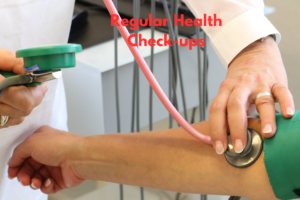Health education is essential in improving our lives in many ways. Understanding the 10 importance of health education will help you make educated choices about your health and wellness. This article will go deeper into how health education promotes positive habits, enhances the prevention of illnesses, boosts mental health awareness, and much more. You’ll understand why health education is essential for everyone by the end. By looking at these benefits, let’s see how health education can improve your health and wellness today.
Promotes Healthy Lifestyle Choices
 Health education teaches us the value of adopting healthy lifestyle decisions. It helps us live healthier by teaching the importance of a balanced diet and daily exercise. For instance, comprehensive health education programs significantly reduce student obesity rates because children learn the benefits of eating healthy and being active early.
Health education teaches us the value of adopting healthy lifestyle decisions. It helps us live healthier by teaching the importance of a balanced diet and daily exercise. For instance, comprehensive health education programs significantly reduce student obesity rates because children learn the benefits of eating healthy and being active early.
Benefits of Healthy Lifestyle Choices
- Better physical health
- Improved mental well-being
- Increased energy levels
- Enhanced longevity
Enhances Disease Prevention
One of the 10 importance of health education benefit is its role in preventing diseases. Health education programs have reduced HIV/AIDS, diabetes, and heart disease. These programs can save lives by teaching healthy habits and avoiding dangerous behaviors. For example, public health programs that warn against smoking have reduced smoking rates and smoking-related disorders.
Strategies for Disease Prevention
- Regular vaccinations
- Healthy eating habits
- Routine health screenings
- Avoiding risky behaviors
Boosts Mental Health Awareness
 Mental health is as important as physical wellness, and health education contributes to raising awareness about mental health problems. Schools and communities that promote mental health education lessen stigma rates, which motivates people to ask for help. The power of health education is shown by real-life experiences of people overcoming mental health issues via early education and intervention.
Mental health is as important as physical wellness, and health education contributes to raising awareness about mental health problems. Schools and communities that promote mental health education lessen stigma rates, which motivates people to ask for help. The power of health education is shown by real-life experiences of people overcoming mental health issues via early education and intervention.
Key Components of Mental Health Education
- Understanding mental health disorders
- Recognizing symptoms early
- Reducing stigma
- Promoting supportive environments
Encourages Regular Health Check-ups
 Health education points out the importance of regular health check-ups. Routine screenings may identify health issues early, resulting in better outcomes. Health education about regular doctor visits helps prevent major illnesses. For example, good health education programs increase the identification of cancer and chronic disease and the success of treatment.
Health education points out the importance of regular health check-ups. Routine screenings may identify health issues early, resulting in better outcomes. Health education about regular doctor visits helps prevent major illnesses. For example, good health education programs increase the identification of cancer and chronic disease and the success of treatment.
Importance of Regular Check-ups
- Early disease detection
- Preventive care
- Building a relationship with healthcare providers
- Monitoring existing conditions
Reduces Healthcare Costs
Health education helps reduce overall healthcare costs by promoting preventive care and healthy lifestyles. Educating people about managing their health makes them less likely to require expensive medical treatments. Case studies have shown that societies with solid health education programs pay less for healthcare services. This is because educated individuals are better at addressing chronic conditions and bypassing emergency care.
Ways to Reduce Healthcare Costs
- Preventive measures
- Healthy lifestyle choices
- Regular health monitoring
- Educated decision-making
Improves Quality of Life
Quality of life improves health significantly when people are educated about their health. Health education enables people to control their health, making them happier and healthier. For example, people who know the importance of mental and physical health are likelier to participate in activities promoting well-being, such as exercising daily, eating nutritious foods, and maintaining relationships with others.
Factors Contributing to Quality of Life
- Physical health
- Mental well-being
- Social Connections
- Healthy environment
Increases Life Expectancy
More educated people have longer and healthier lives. Research shows that health education leads to longer life expectancy. Health education extends longevity by educating individuals about unhealthy habits and healthy lifestyles. For example, countries with complete health education programs usually report higher average life expectancies than those without.
Impact on Life Expectancy
- Reduced risk of chronic diseases
- Better health management
- Adoption of healthy habits
- Access to healthcare resources
Empowers Communities
Health education changes communities. When a community is informed about health, everyone benefits. Public health has improved with community health education. Success reports from various parts of the earth show how educating a community about health can lower disease and infection rates and healthier, more productive populations.
Community Health Education Initiatives
- Public health campaigns
- School health programs
- Community workshops
- Health fairs and screenings
Fosters Health Literacy
Understanding health-related data is essential for decision-making. Health education promotes health literacy and helps people understand health-related data. Health literacy programs help people understand and act on health-related data, improving health outcomes. For example, literacy programs that teach patients how to read prescription labels correctly help prevent medication errors.
Benefits of Health Literacy
- Improved understanding of health information
- Better health decisions
- Increased compliance with medical advice
- Enhanced ability to navigate the healthcare system
Supports Childhood Development
 Early health education is crucial. Children who receive early health education develop healthy habits that last a lifetime. Their future health benefits from this education. Schools that include health education in their curriculum report better overall student health. For example, children who learn about the significance of hygiene and nutrition are less inclined to suffer from preventable illnesses.
Early health education is crucial. Children who receive early health education develop healthy habits that last a lifetime. Their future health benefits from this education. Schools that include health education in their curriculum report better overall student health. For example, children who learn about the significance of hygiene and nutrition are less inclined to suffer from preventable illnesses.
Role of Health Education in Childhood
- Developing healthy habits
- Preventing childhood diseases
- Promoting physical activity
- Teaching nutrition and hygiene
Encourages Health Advocacy
Another important aspect of the 10 importance of health education is that it encourages advocacy for health. People who know much about health problems are more likely to push for better health policies and practices. This might lead to better regulations and measures for public health that help whole communities.
Health Advocacy Benefits
- Improved public health policies
- Increased community involvement
- Better access to healthcare services
- Promotion of healthy lifestyles
Enhances Social and Emotional Skills
Health education isn’t just about making people healthier; it also helps them get along with others and deal with stress. Learning about health can improve empathy, connection, and emotional intelligence, which are important for personal growth and getting along with others.
Social and Emotional Benefits
- Better communication skills
- Increased empathy
- Improved emotional intelligence
- Stronger relationships
Provides Critical Life Skills
Health education teaches people important skills that help them through different times of life. These skills are very helpful for maintaining health and well-being because they help you think critically, make decisions, and solve problems.
Essential Life Skills from Health Education
- Critical thinking
- Decision-making
- Problem-solving
- Self-management
Conclusion
In conclusion, the 10 importance of health education cannot be overstated. Health education is a powerful way to improve the health of individuals and communities. It can help people make healthy living choices, lower healthcare costs, and live longer. We can now take steps to improve our health and wellness by learning and appreciating these benefits.

